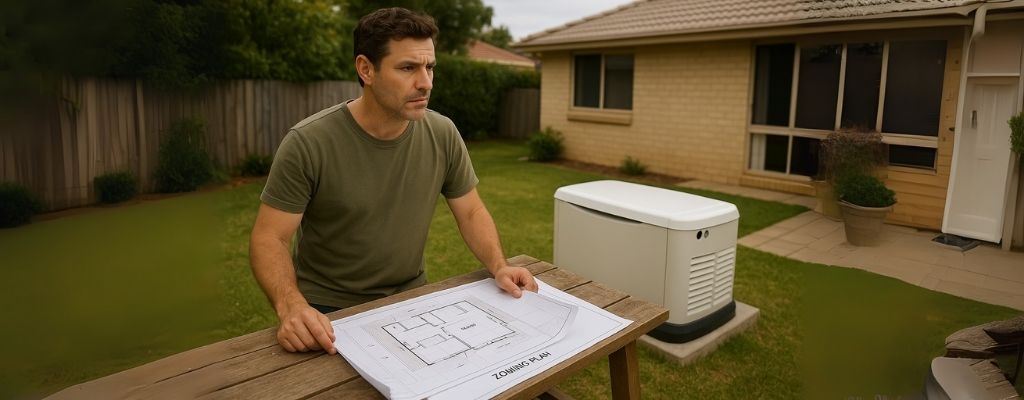
What Are the Zoning Laws for Standby Generators?
Installing a generator isn’t just about plugging it in and hoping for the best. In Australia, zoning laws mean you’ll need council approval, noise control, and proper placement—or risk fines and a very grumpy neighbour. Here's how to get it right the first time.

Key Zoning and Building Codes for Your Standby Generator
Installing a standby generator in Australia isn’t just about picking a spot and firing it up. Local councils and national standards each have their own say, and together, they set the rules for safe, legal installation.
Local councils focus on things like noise, setbacks from boundaries, and environmental impact. National standards, like those from Standards Australia, zero in on technical safety – things like electrical wiring, ventilation, and fuel storage.
Knowing what applies to your postcode helps avoid headaches (and hefty fines) down the track.
Noise Regulations for Your Standby Generator
Generators are loud. Your neighbours probably already think your mower is noisy enough. So it’s no surprise local councils have noise limits, especially in residential areas.
If your generator roars like a jet engine, expect complaints – and maybe even a visit from council.
Solutions? Go for a quieter model, fit an acoustic enclosure, and only run it during approved hours. Every council sets its own decibel rules, so check yours before you buy.

Permissible Generator Placement and Setbacks
You can’t just chuck your generator anywhere.
Most councils require at least 1 to 2 metres of clearance from property lines. It also needs to be away from windows, doors, and vents to keep exhaust fumes from drifting indoors.
Install it on a stable, non-combustible surface with easy access for servicing. And if you’re near bushland or in a high-risk fire zone, the rules might get even tighter.
Understanding Fuel and Electrical Requirements for a Generator
Fuel and power setups aren’t something to wing. Standby generators need to be installed with proper electrical connections and earthed to meet safety standards.
If you're using petrol, diesel, or LPG, you'll also need to follow fuel storage regulations. For solar or hybrid units, you still need to comply with grid connection and battery safety rules.
Cut corners here and you're risking not just fines, but serious hazards too.

The Standby Generator Permit Process
If you're adding a generator to your property, chances are you'll need a permit. Skipping it could land you in hot water with the council.
How to Obtain Your Generator Permit
Start by checking your council's website or giving them a call.
Most permit applications require:
-
A site plan showing where the generator will be installed
-
Generator model and specifications
-
Proof that it meets noise limits
-
A layout showing how it will connect to power and fuel sources
Some councils offer fast-tracked approvals for minor installations. Others might require a full development application.
Hot tip: working with a licensed installer who knows the local process can save you time, paperwork, and stress.

The Right Standby Generator for Your Property
Not all generators will tick the zoning boxes. What works in the bush might not fly in the suburbs.
Your power needs, property size, and council rules will all influence which generator is right for you.
Choosing a Generator That Meets Zoning Laws
Look for generators with compliance-friendly features:
-
Low noise output (ideally under 60 dB for residential areas)
-
Emissions-certified engines
-
Sound-reducing or weatherproof enclosures
Inverter models are top picks for small homes or neighbourhoods with strict noise rules. For bigger properties or those off-grid, diesel or LPG might be better – just make sure they meet clearance and safety guidelines.
Before you buy, check with your council. A five-minute phone call could save you a five-grand mistake.
You might also like:
-
What Happens If You Don't Ground a Generator?
- Where Are Generators Made?
- Who Repairs Generators?
- Should I Rent or Buy a Generator?
- What’s the Warranty on Most Generators?
- Are Refurbished Generators Worth Buying?
- Are Generators Eco-Friendly?
- How Do I Prepare a Generator for a Hurricane?
- How Do Sand and Dust Affect Generators?
- What Insurance Considerations Are There for Generators?


